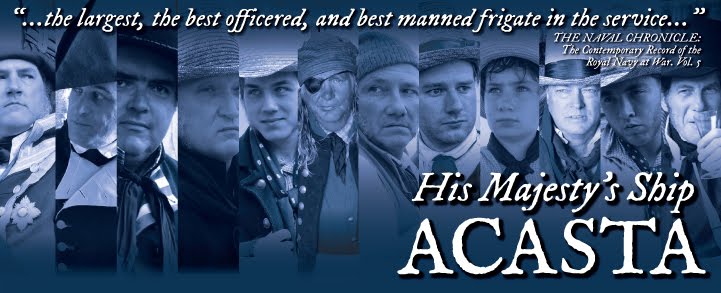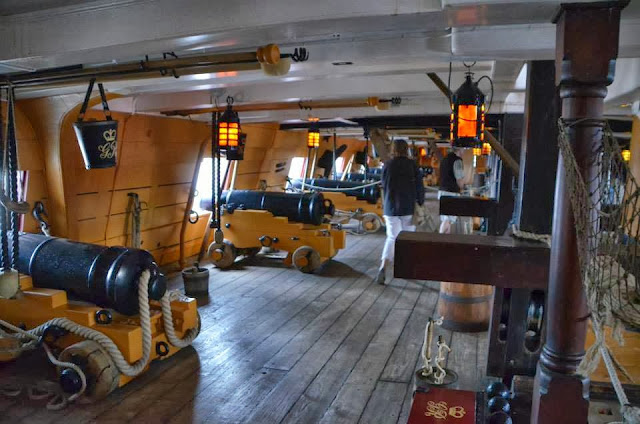Monday, December 31
Friday, December 28
The Sailing Master - a Brief Review
By Lee Henschel Jr.
a mini review by Tony Gerard
a mini review by Tony Gerard
This is my first time reviewing a novel and maybe I’m not the best guy for the job. Among historic re-enactors I tend to be what is referred to as a “button counter”. In other words I get caught up in small details of historical accuracy in both material and social culture. Several of my nonhistorian friends now refuse to go to historic movies with me. They say I ruin the movie with my constant complaints about historic authenticity. During “New World” my girlfriend at the time actually got up and moved several seats away from me.
That being said, the author of “The Sailing Master” asked me to review his historic novel, so here goes….
The novel is set in 1798, the main character being a ship’s boy on a Royal Navy frigate. Right away (page 3 ) I found a couple of historic faux pas – the captain is described as having a beard, definitely not the style for a late 18th century gentleman, and putting his thumbs in his belt loops. Belt loops didn’t appear until the early 20th century. But Mr. Henschel was kind enough to send me a free copy, so I kept reading and then… I was caught up in the story. It’s definitely a fun read. I’m the kind of guy who goes to bed early (9pm) on a weeknight. I stayed up late reading two nights in a row.
The story is told in first person, but it’s written in a faster paced 20th century style. Henschel does throw in enough 18th century words and phrases to give the casual (read non- button counter) reader the feel of an 18th century narrative. The characters definitely have a modern mindset within a historic setting. This is especially obvious in the disrespect with which the Captain treats captured enemy officers – just not done in the 18th century by gentlemen.
Having said that it is obvious that Henschel knows sailing and 18th century navigation. That comes across and is a plus in my opinion.
The novel is an adventure/mystery story. Several aspects are not that real life believable, but who cares? Think Michael Crighton rather than Patrick O’Brian. The story is fast paced and it kept my interest. That’s what kept me up. I was always reading just a bit more to see how this turned out, but by the time “this” was resolved there was something else- and I had to see how that turned out. As much as I love the Aubry/Maturin series I never had trouble putting it down to pick up again later. Not so for “The Sailing Master”. Be forewarned, just like real life, Henschel can take away a character you might have begun to like with no apologies. Also be warned, the book is meant to be the first of a series, and it ends as cliff hanger. I, for one, look forward to seeing what happens to ship’s boy Owen Harriet.
Thursday, December 27
HMS Victory, a Virtual Tour
Special thanks to JASNA -GL member Janet Abell for allowing us to make use of the pictures she took aboard HMS Victory during her most recent visit to England, September 2013.
Labels:
HMS Victory,
Images,
Lord Nelson,
Miscellany
Wednesday, December 26
Find My Past - Trafalgar
Labels:
HMS Victory,
Lord Nelson,
Miscellany,
Video
Monday, December 24
The 4 Biggest Frigates of the North American Station
The subjoined table of the comparative dimensions of British and American ships, will enable the reader to appreciate the heroism with which our officers and seamen have defended themselves in the recent actions with our trans-atlantic descendants.
By this table it will be seen, that these American frigates are longer than an English first-rate; that they are longer than, and of nearly equal tonnage with, our modern large seventy-fours, and of greater tonnage than our old seventy-fours;that they are longer, broader, and of greater tonnage than any of our sixty-fours; and that they exceed in tonnage our fifties, in the proportion of nearly three o two; and our thirty-eights in the proportion of seven to four. Is not the term frigate most violently perverted, when applied to such vessels? As well might we call the Ville de Paris a fifty, or Caledonia a sixty-four; or as well might we call the one a jolly-boat and the other a yawl.
An excerpt from 'The Naval Chronicle: The Contemporary Record of the Royal Navy at War" 1813
Subscribe to:
Posts (Atom)


















































